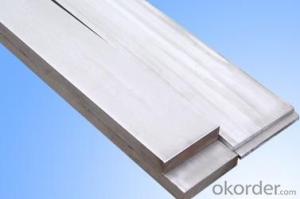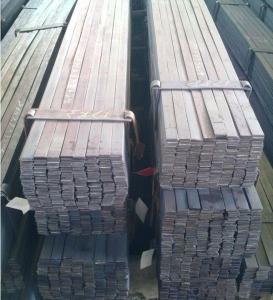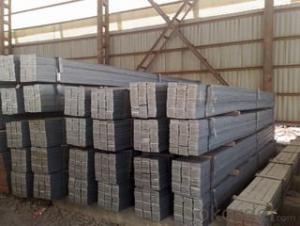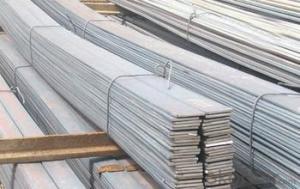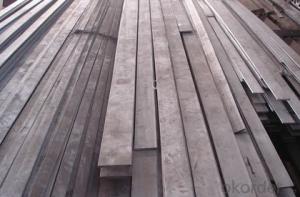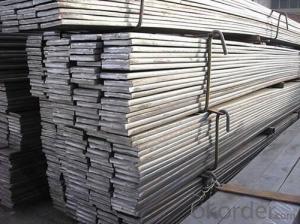Hot Rolled Grade ASTM A36 S235JR SS400 Steel Flat Bar Sizes
- Loading Port:
- Tianjin
- Payment Terms:
- TT or LC
- Min Order Qty:
- 3 m.t.
- Supply Capability:
- 10000 m.t./month
OKorder Service Pledge
OKorder Financial Service
You Might Also Like
Item specifice
Hot Rolled Grade ASTM A36_S235JR_SS400 Steel Flat Bar Sizes
Details of Hot Rolled Grade ASTM A36_S235JR_SS400 Steel Flat Bar Sizes
Name | Hot Rolled Grade ASTM A36_S235JR_SS400 Steel Flat Bar Sizes |
Shape | Flat Bar |
Standard | GB/ASTM/SAE/AISI/DIN/JIS/EN/BS |
Surface Treatment: | Black/Peeling/Polished/Machined |
Delivery Condition: | Hot Rolled or Forged/Peeled or Black Surface |
Test | SGS/UT 100% Elements Testing |
Certificate: | ISO/Mill Certificate |
Service: | 24 hours online service / |
more than 20 years trading and manufacture | |
Quality Assurance: | the third party inspection, such as SGS, BV, TUV…etc. is acceptable |
Packaging Details: | Seaworthy Packaging or as per customer's packing instruction |
steel flat bar grade | A36, Q235, Q195, SS400, St37-2 |
steel flat bar standard | GB, ASTM, AISI, EN, JIS |
steel flat bar thickness | 1.8mm-17.75mm |
steel flat bar width | 10mm-870mm |
steel flat bar length | 6m, 9m, 12m or as customer requirement |
steel flat bar technique | Slitting hot rolled steel coil |
Specification of Hot Rolled Grade ASTM A36_S235JR_SS400 Steel Flat Bar Sizes
Width | Thickness | Length | Theoretical Weight |
(mm) | (mm) | (m) | (kg/m) |
20 | 2 | 6/9/12 | 0.31 |
20 | 2.5 | 6/9/12 | 0.39 |
20 | 2.75 | 6/9/12 | 0.43 |
25 | 2.5 | 6/9/12 | 0.49 |
25 | 3.75 | 6/9/12 | 0.74 |
30 | 2.5 | 6/9/12 | 0.59 |
30 | 3.5 | 6/9/12 | 0.82 |
30 | 9.75 | 6/9/12 | 2.3 |
40 | 3.5 | 6/9/12 | 1.1 |
40 | 4.75 | 6/9/12 | 1.5 |
40 | 11.75 | 6/9/12 | 3.69 |
50 | 2.75 | 6/9/12 | 1.08 |
50 | 4.5 | 6/9/12 | 1.77 |
50 | 9.75 | 6/9/12 | 3.83 |
60 | 5.5 | 6/9/12 | 2.6 |
60 | 7.5 | 6/9/12 | 3.53 |
60 | 11.5 | 6/9/12 | 5.42 |
80 | 5.5 | 6/9/12 | 3.45 |
80 | 7.5 | 6/9/12 | 4.71 |
80 | 11.75 | 6/9/12 | 7.38 |
100 | 3.25 | 6/9/12 | 2.55 |
100 | 4.75 | 6/9/12 | 3.73 |
100 | 7.5 | 6/9/12 | 5.89 |
120 | 9.75 | 6/9/12 | 9.18 |
120 | 11.75 | 6/9/12 | 11.07 |
150 | 9.75 | 6/9/12 | 11.48 |
150 | 11.5 | 6/9/12 | 13.54 |
150 | 13.5 | 6/9/12 | 15.9 |
160 | 11.75 | 6/9/12 | 14.76 |
200 | 9.5 | 6/9/12 | 14.92 |
250 | 5.75 | 6/9/12 | 11.28 |
340 | 7.75 | 6/9/12 | 20.68 |
CNBM Introduction of Hot Rolled Grade ASTM A36_S235JR_SS400 Steel Flat Bar Sizes Supplier
CNBM International Corporation is the most import and export platform of CNBM group(China National Building Material Group Corporation) ,which is a state-owned enterprise, ranked in 270th of Fortune Global 500 in 2015.
With its advantages, CNBM International are mainly concentrate on Cement, Glass, Iron and Steel, Ceramics industries and devotes herself for supplying high quality series of refractories as well as technical consultancies and logistics solution.
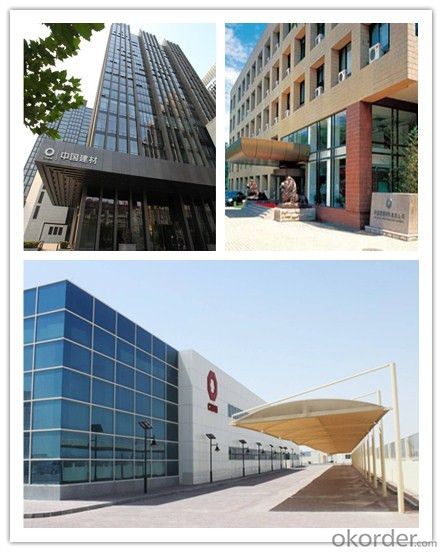
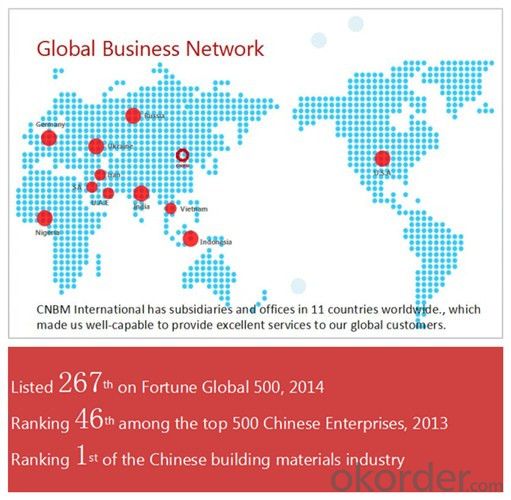
Packaging & Delivery Hot Rolled Grade ASTM A36_S235JR_SS400 Steel Flat Bar Sizes
Packaging Detail | Sea worthy packing /as per customer's packing instruction |
Delivery Detail | 15 ~ 40 days after receiving the deposit |
Products Show
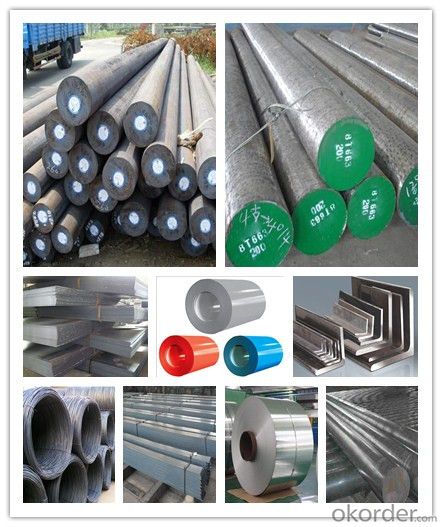
FAQ:
Are you a trading company or manufacturer? | Manufacturer |
What’s the MOQ? | 3 metric ton |
What’s your delivery time? | 15-35 days after downpayment received |
Do you Accept OEM service? | Yes |
what’s your delivery terms? | FOB/CFR/CIF |
What's the Payment Terms? | 30% as deposit,70% before shipment by T/T |
Western Union acceptable for small amount. | |
L/C acceptable for large amount. | |
Scrow ,Paybal,Alipay are also ok | |
Why choose us? | Chose happens because of quality, then price, We can give you both. Additionally, we can also offer professional products inquiry, products knowledge train (for agents), smooth goods delivery, excellent customer solution proposals. |
What's your available port of Shipment? | Main Port, China |
What’s your featured services? | Our service formula: good quality+ good price+ good service=customer's trust
|
Where are your Market? | Covering more than 160 countries in the world |
- Q:Can special steel be used for making aerospace components?
- Indeed, aerospace components can be manufactured using special steel. Also referred to as aerospace steel or aircraft steel, this specific type of steel is meticulously designed to meet the rigorous demands and strict requirements of the aerospace sector. It possesses outstanding properties such as exceptional strength, durability, and heat resistance, all of which are vital for enduring the extreme conditions faced by aircraft components during flight. Aerospace components, including landing gear, engine parts, fasteners, and structural elements, often necessitate materials that can maintain their integrity even when subjected to high temperatures, stress, and corrosive environments. Special steel alloys are developed to possess excellent mechanical properties, such as high tensile strength, fracture toughness, and resistance to fatigue, creep, and corrosion. These properties render them suitable for crucial aerospace applications where safety and reliability are of the utmost importance. Furthermore, special steel can be customized to meet specific requirements, such as weight reduction, improved fuel efficiency, and enhanced performance. By employing advanced alloying techniques and heat treatments, aerospace steel can be engineered to possess desirable characteristics like increased hardness, wear resistance, and dimensional stability. This enables the production of lighter and more efficient aerospace components without compromising on strength or safety. In conclusion, special steel stands out as the preferred material for manufacturing aerospace components due to its exceptional mechanical properties, heat resistance, and corrosion resistance. Its ability to withstand extreme conditions and be tailored to specific requirements makes it an ideal choice for producing critical parts used in the aerospace industry.
- Q:How is ultra-high-strength alloy steel used in the aerospace industry?
- Ultra-high-strength alloy steel is extensively used in the aerospace industry for its exceptional strength-to-weight ratio and resistance to corrosion. It is employed in various components such as aircraft structures, landing gears, engine parts, and fasteners. This steel allows aircraft to be lighter, more fuel-efficient, and capable of withstanding extreme conditions encountered during flight.
- Q:How does special steel perform in radiation shielding applications?
- Special steel is renowned for its outstanding performance in shielding against radiation, widely recognized for its unique properties and composition. It is an ideal choice in safeguarding against harmful radiation due to its exceptional qualities. One significant advantage of special steel is its remarkable density, which allows for the effective absorption and attenuation of radiation. This attribute enables it to serve as a barrier, effectively preventing the penetration of harmful radiation into sensitive areas. By significantly reducing radiation exposure, special steel plays a crucial role in diverse industries, including nuclear power plants, medical facilities, and aerospace applications. Furthermore, special steel possesses excellent mechanical strength and durability, ensuring long-lasting and reliable radiation shielding. It can withstand extreme conditions while maintaining its effectiveness over time. This durability is particularly vital in environments with continuous or ongoing radiation exposure. Moreover, special steel exhibits high resistance to corrosion and degradation, making it indispensable in radiation shielding applications. This resistance ensures the material remains intact and can provide the necessary protection against radiation for an extended period. As a result, frequent maintenance and replacement are minimized, leading to cost savings and improved operational efficiency. Additionally, special steel can be customized to meet specific requirements, allowing for tailored designs and configurations. This flexibility enables the development of radiation shielding solutions optimized for the unique needs of various applications. Whether it involves shielding panels, containers, or enclosures, special steel can be adapted to provide the most efficient and effective radiation protection. In summary, special steel excels in radiation shielding applications due to its high density, mechanical strength, durability, corrosion resistance, and customization capabilities. It offers reliable and long-lasting radiation protection, ensuring the safety of personnel and equipment in industries where radiation exposure is a concern.
- Q:How does special steel enhance the durability of products?
- Special steel enhances the durability of products by providing exceptional strength, resistance to corrosion, and wear and tear. Its unique composition and manufacturing processes result in a material that can withstand high pressures, extreme temperatures, and harsh environments, prolonging the lifespan of various products and reducing the need for frequent repairs or replacements.
- Q:What are the specific requirements for special steel used in the marine industry?
- For the marine industry, special steel must meet specific criteria to be suitable for the harsh marine environment. These criteria encompass high strength, corrosion resistance, and toughness. First and foremost, the special steel used in the marine industry must possess high strength to endure the extreme loads and stresses encountered at sea. This strength enables the steel to resist deformation and maintain its structural integrity when subjected to heavy loads, such as the weight of the ship or the forces exerted by waves and wind. Corrosion resistance is another crucial requirement for marine-grade steel. The highly corrosive nature of saltwater presents a significant challenge. Marine-grade steel should exhibit exceptional resistance to corrosion, preventing the formation of rust and other forms of degradation. This resistance ensures the longevity of steel structures and reduces maintenance and repair costs. Furthermore, toughness is an essential characteristic of marine-grade steel. It must be capable of withstanding impact and shock loads, as ships and offshore structures are constantly exposed to rough seas and potential collisions. The steel should possess the ability to absorb and distribute energy without fracturing or failing, guaranteeing the safety and reliability of marine structures. In addition to these requirements, special steel used in the marine industry must also adhere to specific standards and certifications established by classification societies such as the American Bureau of Shipping (ABS), Lloyd's Register (LR), or Det Norske Veritas Germanischer Lloyd (DNV GL). These organizations establish standards for materials, construction, and inspection processes to ensure the dependability and safety of marine structures. Overall, the specific requirements for special steel utilized in the marine industry encompass high strength, corrosion resistance, toughness, and compliance with industry standards and certifications. Fulfilling these requirements guarantees the steel's ability to withstand the distinct challenges posed by the marine environment and contributes to the safety and durability of marine structures.
- Q:How is electrical resistance steel used in heating elements?
- Electrical resistance steel is commonly used in heating elements due to its high resistivity and ability to withstand high temperatures. When an electric current passes through the steel, its resistance generates heat, allowing the heating element to efficiently convert electrical energy into heat energy. This makes it suitable for applications such as electric stoves, water heaters, and industrial furnaces.
- Q:What are the different non-destructive testing methods used for special steel?
- There are several non-destructive testing methods used for special steel, including ultrasonic testing, magnetic particle testing, liquid penetrant testing, radiographic testing, and eddy current testing. These methods help to detect any defects or flaws in the steel without causing any damage. Ultrasonic testing uses high-frequency sound waves to evaluate the internal structure of the steel, while magnetic particle testing and liquid penetrant testing are used to detect surface defects through the use of magnetic fields and dye penetrants, respectively. Radiographic testing involves the use of X-rays or gamma rays to examine the internal structure of the steel. Eddy current testing, on the other hand, uses electromagnetic induction to detect surface or near-surface defects. Overall, these non-destructive testing methods play a crucial role in ensuring the quality and integrity of special steel.
- Q:What are the different certifications available for special steel?
- Depending on the specific industry and application, there are multiple certifications available for special steel. Some of the well-known certifications are as follows: 1. ISO 9001: This certification ensures that the special steel manufacturer has implemented and maintained a quality management system that adheres to international standards. It signifies the company's dedication to consistently delivering products that meet customer requirements. 2. ISO 14001: This certification focuses on environmental management and guarantees that the special steel manufacturer has adopted eco-friendly practices in their operations. It showcases the company's commitment to reducing their impact on the environment. 3. Certifications by ASME (American Society of Mechanical Engineers): ASME provides several certifications for special steel used in pressure vessels, boilers, and other applications. These certifications ensure that the special steel meets industry-specific quality and safety standards. 4. PED (Pressure Equipment Directive): This certification is mandatory for special steel used in pressure equipment within the European Union. It guarantees that the steel meets specific safety and quality requirements. 5. Certifications by NACE (National Association of Corrosion Engineers): NACE offers certifications for special steel used in corrosive environments. These certifications ensure that the steel possesses the necessary resistance against corrosion and can endure harsh conditions. 6. Certifications by API (American Petroleum Institute): API offers certifications for special steel used in the oil and gas industry. These certifications ensure that the steel meets various quality and performance standards required for different applications in the industry. 7. Certifications by ASTM (American Society for Testing and Materials): ASTM provides various certifications for special steel based on specific standards and specifications. These certifications guarantee that the steel satisfies the required mechanical properties, chemical composition, and other criteria. Manufacturers, suppliers, and end-users should take these certifications into consideration when selecting special steel for their specific applications. These certifications provide confidence and assurance regarding the quality, safety, and performance of the special steel products.
- Q:How does special steel contribute to reducing energy consumption?
- Special steel can contribute to reducing energy consumption in several ways. Firstly, special steel is often used in the manufacturing of more efficient and lightweight components, such as in the automotive and aerospace industries. These components help to reduce the overall weight of vehicles and aircraft, resulting in lower energy requirements for propulsion. Additionally, special steel can be utilized in the construction of energy-efficient buildings and infrastructure. Its high strength and durability allow for the creation of lighter and thinner structural elements, which can reduce the amount of steel required and the energy needed for construction. Furthermore, special steel alloys can have improved heat transfer properties, making them ideal for the production of energy-efficient appliances and equipment. By enhancing the thermal conductivity, special steel facilitates faster heating or cooling processes, reducing energy consumption in various applications like refrigerators, air conditioners, and industrial machinery. In summary, special steel's contribution to reducing energy consumption lies in its ability to enable lightweight designs, construct energy-efficient buildings, and enhance heat transfer efficiency in appliances and equipment.
- Q:How is special steel used in the manufacturing of consumer goods?
- Special steel is used in the manufacturing of consumer goods due to its exceptional properties such as high strength, durability, and corrosion resistance. It is utilized in various products like kitchen appliances, tools, automotive parts, and electronics, enhancing their performance and increasing their lifespan.
1. Manufacturer Overview |
|
|---|---|
| Location | |
| Year Established | |
| Annual Output Value | |
| Main Markets | |
| Company Certifications | |
2. Manufacturer Certificates |
|
|---|---|
| a) Certification Name | |
| Range | |
| Reference | |
| Validity Period | |
3. Manufacturer Capability |
|
|---|---|
| a)Trade Capacity | |
| Nearest Port | |
| Export Percentage | |
| No.of Employees in Trade Department | |
| Language Spoken: | |
| b)Factory Information | |
| Factory Size: | |
| No. of Production Lines | |
| Contract Manufacturing | |
| Product Price Range | |
Send your message to us
Hot Rolled Grade ASTM A36 S235JR SS400 Steel Flat Bar Sizes
- Loading Port:
- Tianjin
- Payment Terms:
- TT or LC
- Min Order Qty:
- 3 m.t.
- Supply Capability:
- 10000 m.t./month
OKorder Service Pledge
OKorder Financial Service
Similar products
New products
Hot products
Related keywords
